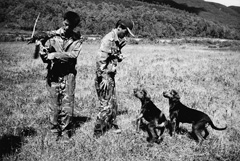The Passionate Culture
 HONG KONG / 2009 / Chinese / Color / Video / 110 min
HONG KONG / 2009 / Chinese / Color / Video / 110 min
Director, Script, Producer: Chung Kam-tong
Editing: Chen Ping
Photography: Li Jian-kun, Wang Xun-gang, Chen Ping, Da Zhu, KC
Sound: Lao Ma
Art Director: Da Zhu
Source: Chung Kam-tong
The history of falconry among the Naxi people of Lijiang in Yunnan Province can be traced back more than 700 years. Experienced falconers and apprentices treat their falcons and hounds as members of the family. Together they run through the fields of Yunnan full of energy and life. Each day of hunting is a battle of wits between a man and his hawk. This isn't simply a historical tradition to the Naxi. It is a vital, liberating enterprise. Falconry may be under threat from wildlife conservationists and the growth of tourism in the ancient city, but for the falconers, today is another day to go out hunting with their beloved partners.
[Director’s Statement] Culture has to be respected, learned, and passed down from generation to generation.
This documentary was filmed in Dayan, a section of the Old Town of Lijiang in Yunnan Province, which has been designated a World Heritage Site by UNESCO. Lijiang was an important town on the ancient Tea-Horse Route.
The traditional inhabitants of Lijiang are members of the Naxi ethnic group. Few people know of the Naxi’s “passionate culture”—falconry, or hunting with hawks, an activity engaged in only by men. In the face of changing times, social development, and other influences, the future of Naxi falconry is confronted with serious challenges. Realizing this, falconers of the current generation and other knowledgeable people try their best to preserve and pass on traditional practices.
The process of Naxi falconry, including the training of hawks (sparrow hawks and goshawks) and hunting with them, reveals a relationship between humans and nature that is full of pure and true love. In fact, dogs and hawks are necessary assistants in the work of human beings. The Naxi’s deep love of nature and the animals is truly impressive.
As a unique cultural activity, Naxi falconry has a history of more than two thousand years. How did falconers inherit this tradition from past generations? How do they catch, train, and hunt with the hawks? How can they respond quickly and adjust to the pressure of living in practical society and the effects and changes wrought by different aspects of the modern age? Will the cultural phenomenon of falconry be able to continue to evoke a colorful picture of the relationship between humans and nature, just like the crystal streams and the old houses in the Old Town of Lijiang?
 Chung Kam-tong (Keith)
Chung Kam-tong (Keith)Born in 1954 in Hong Kong, Chung majored in journalism but worked as a government building contractor and operated a restaurant business to earn a living for his family and four children. He dreamed of pursuing his passion in photography. Attending a teacher training class in 1994 was a turning point in his life. He was invited by a classmate to visit Yunnan in 1996 and decided to stay in Kunming, leaving the restaurant business and his family behind. He worked as a freelance photographer and writer and was inspired by a Hong Kong television documentary in 2002 to make his first documentary in Guizhou Province, the 34-minute Dong Nationality Dage. The Passionate Culture is his second documentary film. Chung has served as a guest professor, lecturing on the art of photography at the Yunnan Art Institute in Kunming from 2003 to the present. |
